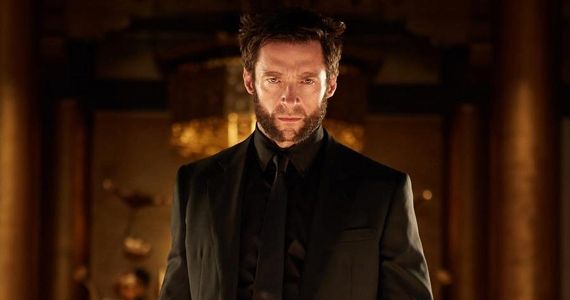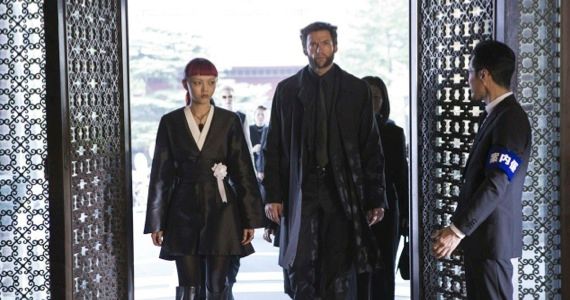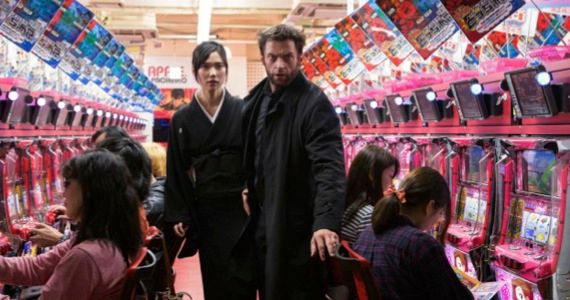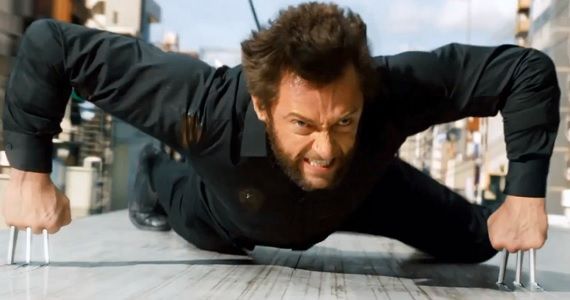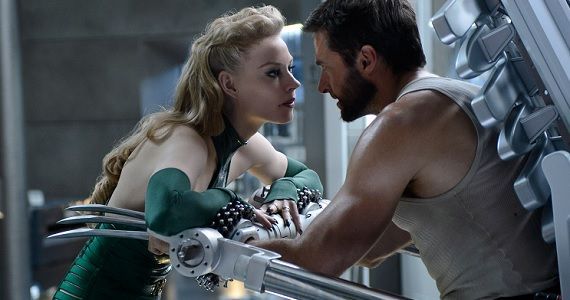The Wolverine ranks among the better X-Men movies - along with Bryan Singer's first two installments and Matthew Vaughn's X-Men: First Class.
The Wolverine picks up with the semi-immortal mutant Logan (Hugh Jackman) looking particularly disheveled, after having spent an unspecified amount of time in self-imposed exile in the Canadian wilderness (following the events of X-Men: The Last Stand). Logan, who is tormented by the survivor's guilt he's accumulated over the centuries - having outlived every person he's cared for - and haunted by recurring visions of his deceased love Jean Grey (Famke Janssen), has abandoned his Wolverine (re: superhero) alter-ego for an isolated existence.
Everything changes when Logan is approached by a mysterious pink-haired woman named Yukio (Rila Fukushima). She informs Wolvie that her employer Yashida (Hal Yamanouchi) - the extremely wealthy founder of a powerful Japanese technology corporation - is on his deathbed and wishes to thank Logan, who saved his life way back in WWII. Logan is hesitant, but soon agrees to accompany Yukio back to Tokyo, in order to to bid farewell to his old acquaintance - unaware that he's taken the first step on a treacherous journey that will take him into the sordid underbelly of Japanese society, and leave him permanently altered in a mental, spiritual and physical sense.
The Wolverine is (mostly) a thematically-rich X-Men story that was realized under the direction of James Mangold, a filmmaker who has spent his career bouncing around from genre to genre (see: Girl, Interrupted, 3:10 to Yuma, Knight and Day, etc.). Mangold commits to exploring the depths of Logan's emotional baggage while he and his collaborators infuse the proceedings with a strong appreciation for - and understanding of - cinema history and tradition. The final result: The Wolverine feels refreshingly different than just about every other superhero movie produced to date... for the first 3/4ths of its running time, anyway.
Many people who were eager to see a unique superhero/comic book adaptation felt their hopes shatter after the original version of The Wolverine - planned by director Darren Aronofsky (Black Swan) and screenwriter Christopher McQuarrie (Jack Reacher) - collapsed in pre-production. There are times (read: the third act) when The Wolverine suffers from muddled storytelling and uninspired spectacle - the same problems that are present throughout the infamous prequel, X-Men Origins: Wolverine. Still, the majority of Mangold's film ended up being (surprisingly) close to what McQuarrie had in mind: a thoughtful character study of the eponymous Adamantium-claw wielding mutant, with the occasional action sequence included here and there (for good measure).
Jackman, as Logan, appears to be in the best physical condition of his career here; furthermore, this film offers the most captivating portrayal of the character put on the big screen yet (how true he is to the X-Men comic books' depiction - that's open for debate). Under Mangold's watch, Jackman successfully makes Wolverine feel like the superhero equivalent of Clint Eastwood's Man with No Name (from Sergio Leone's spaghetti westerns): a "ronin" or samurai who is without a purpose, as one of the characters observes early on. There are parts of the score composed by Marco Beltrami (3:10 to Yuma, The Hurt Locker) that recall Ennio Morricone's music for Leone films like The Good, the Bad and the Ugly, which helps to hammer that idea home and strengthen the film's East-meets-West subtext in the process.
Above all else, though, The Wolverine is informed by Noir traditions, beginning with the opening flashback to WWII (i.e. the event credited for inspiring the American Noir movement). Mangold and the film's cinematographer, Ross Emery (a second-unit director of photography on Dark City and The Matrix trilogy) do a solid job of making Japan feel like the setting for an old-school detective story: shadowy and menacing at night, deceivingly harmless by day. Similarly, Logan is a proper choice for the Noir archetype of an investigating protagonist: he's emotionally-fragile and vulnerable one moment, and in the next he throws a bad man out a window without even blinking an eye.
Action scenes in The Wolverine are relatively few and far between - which is good, because they have a tendency to be the film's weakest moments. A major theme in the film is the brutal nature of death and violence, but that only comes across in the movie's best - and bloodiest - fight sequence. The other combat-heavy beats are too choppy in their structure, save for the much-advertised fight atop a bullet train (which is entertaining, but kind of extraneous to the plot). Likewise, a healthy chunk of the final half-hour (including the climax) includes some hollow CGI-heavy fisticuffs and a ninja battle that is cut-short. The Wolverine feels likes an R-Rated movie edited down to PG-13, and that compromise undercuts some of its successes.
There are many supporting characters in The Wolverine, but a handful of them are either half-baked or unnecessary additions to the plot. Yukio, for example, is the interesting and well-rounded "sidekick" for Wolvie, while Mariko (Tao Okamoto) - Yashida's grand-daughter - is in part a damsel-in-distress, but her own personal conflict and capabilities help to elevate the character above that basic archetype. Brian Tee, Hiroyuki Sanada and Will Yun Lee all play morally-questionable or corrupt individuals, who populate the neo-Noir setting. None of their characters are all that memorable, but each one serves a purpose in advancing the story.
Too bad the same cannot be said for the mutant Viper (Svetlana Khodchenkova), a femme fatale whose role in the plot needed a rewrite - since her presence raises more questions than it answers (especially when you examine the film's plot mechanics more closely). One look at the individual resume for each of the film's credited writers - Mark Bomback (Live Free or Die Hard, Total Recall (2012)) and Scott Frank (Out of Sight, Minority Report) - and you start to suspect that maybe one of them was more responsible than the other - as far as inserting empty action scenes and too many characters into the narrative is concerned.
Fortunately, Mangold keeps things running smoothly - until the last half-hour - and, in the end, accomplishes what he wanted: to do right by the great Wolverine comic book mini-series written by Chris Claremont and illustrated by Frank Miller. As such, The Wolverine ranks among the better X-Men movies - along with Bryan Singer's first two installments and Matthew Vaughn's X-Men: First Class - even though its artistic compromises prevent it from reaching greatness.
One last note: The Wolverine features post-converted 3D that adds little to the film and makes the dark scenery even murkier, so those who are picky about the premium ticket prices are advised to go for a 2D screening. Also, be sure to stay after the end titles begin - there is indeed a mid-credits scene that's worth waiting around for.
For an in-depth discussion of the film by the Screen Rant editors check out our Wolverine episode of the SR Underground podcast.
[poll id="650"]
_____
The Wolverine is 126 minutes long and Rated PG-13 for sequences of intense sci-fi action and violence, some sexuality and language. Now playing in 2D and 3D theaters.

